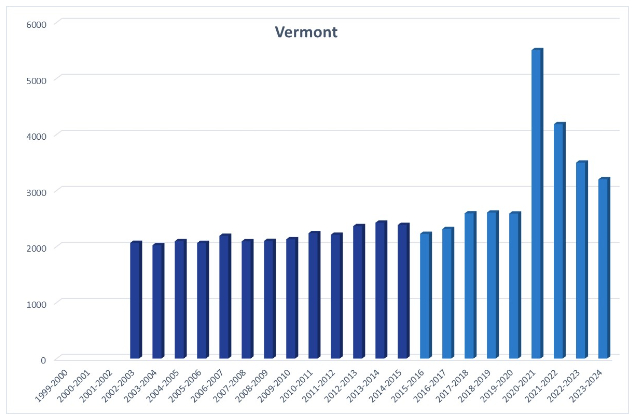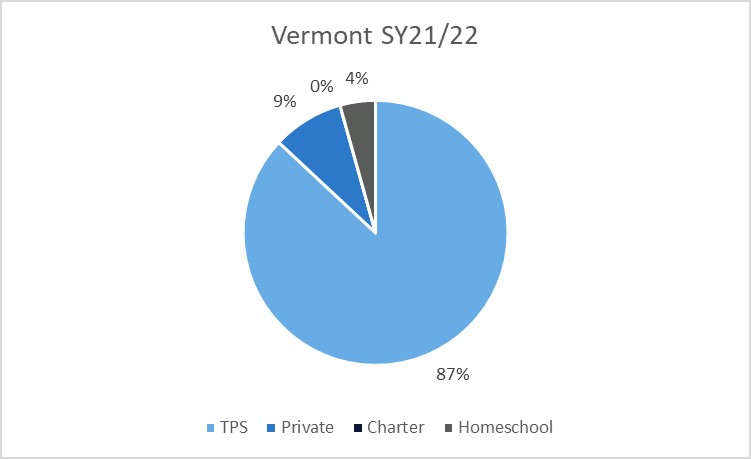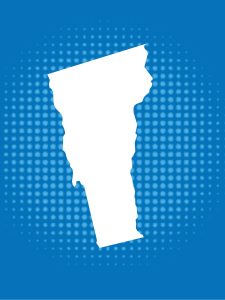In 2023, Vermont made changes to the rules to simplify homeschool enrollment. The state created the Agency of Education's Home Study Team to oversee homeschool participation. Vermont also limits the number of children not living in the home or from another family who can be homeschooled to two.
History
Vermont, located in the northeastern United States, legalized homeschooling in 1987. However, in 2023, the state changed homeschool enrollment laws that simplified the process. In Vermont, home study and home schooling mean the same thing: the family is responsible for educating the students.
Regulation
The rules for homeschool participation in Vermont changed in 2023. For example, families must still submit a Notice of Intent form to the state when they begin homeschooling. However, they no longer must submit a minimum course of study. See here for more information on these recent changes. Vermont requires parents who elect to homeschool their children, ages 6 to 16, to notify the state annually. Parents must attest that students will receive a minimum of 175 days of instruction. Instruction in the core subjects (with some variation by age) is also required, although reporting a minimum course of study to the state is no longer required. Parents must, instead, attest that students receive core instruction.
There are no minimum parent education requirements. The recent law changes also removed the requirement that families submit an end-of-year assessment to the state. Still, homeschooled students are required to choose one of several assessment options to measure personal progress and retain for their records. Assessment options include standardized testing, evaluation by a certified teacher, or a portfolio of work.
Homeschooled students in Vermont have some access to their local public school offerings. While other nonpublic students cannot take courses at their local public school, homeschooled students can. However, access is limited to two of the five core courses. Homeschooled students also can participate in extracurricular activities “as space permits.” There is no funding available for these offerings, and it is uncertain if homeschool families must pay. It is clear, however, that students with special needs in Vermont who elect to homeschool are not guaranteed any services from their local public school district.
State Data
Vermont homeschool participation has grown slowly over the last decade. However, participation doubled during the pandemic, and while some of those students appear to have returned to their local schools, many continue to homeschool. For example, around 2,000 students reported homeschooling in 2010 and grew to over 5,000 at the height of the pandemic.

Similarly, U.S. Census estimates indicate that around 4.1% of Vermont families homeschooled in the spring of 2020 and increased to 16.9% by the fall of 2020. Note that these percentages reflect family participation. Student participation would be higher, given that many families have more than one child. During the 2022 and 2023 school years, the U.S. Census found an average of 4.1% of all K-12 students in the state were homeschooled.
Cross-Sector Comparison
During the 2019-20 academic year, 2.6% of Vermont’s K-12 students were homeschooled. Homeschool participation in the state was much lower than the 9% of private school students. In 2021-22, 4.3% of Vermont’s K-12 students were homeschooled. Homeschool participation in the state was much lower than the 8.7% of students attending private schools.

School Choice Context
In addition to homeschooling, parents in Vermont have various educational choices available. These options include open enrollment in traditional public schools, a few magnet schools, and a town tuitioning voucher for students who live in towns without a public school. Vermont has no charter schools. There is no public money available for homeschooling families in Vermont. The town tuitioning benefit does not apply to homeschool expenses and, until recently, could not be used to attend religious schools.
Commentary
Vermont could increase transparency by publicly reporting more of the information it already collects from homeschool families. For example, information on student age, gender, and race would greatly add to the understanding of homeschool participation in the state and the nation.

-
4.1% Families
Around 4.1% of families in Vermont homeschooled prior to the pandemic
-
1987 Legalized
Homeschooling was legalized in 1987 in the state of Vermont.
-

-
More Information
4.1% Families
Around 4.1% of families in Vermont homeschooled prior to the pandemic
1987 Legalized
Homeschooling was legalized in 1987 in the state of Vermont.

More Information
Last updated December 2023.